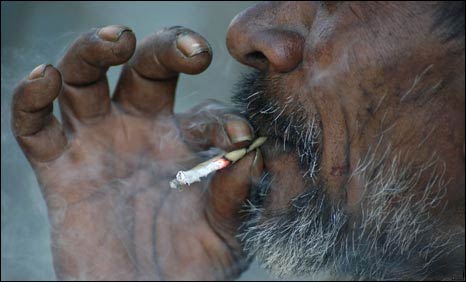Indian Government Snuffs Out Smoking in Public Places
By Parijata Devi Dasi | Окт 04, 2008

The world’s biggest ban on public smoking came into effect in India on 2 October 2008. The Indian central government notification issued on May 30 bans smoking in all public places in India and is the government’s second try in four years to ban smoking. The ban came on the birthday of India’s Independence leader, Mahatma Gandhi who didn’t smoke.
Violation of the ban, imposed under the Cigarettes and Other Tobacco Products (Prohibition of Advertisement and regulation of Trade and Commerce, Production, Supply and Distribution) Act, 2003, will attract a fine of up to Rs.200.
Till the ban was imposed India’s 120 million smokers puffed away at playgrounds, railway stations, public transport, hospitals and even education institutions. However, with the new ban smokers shall have to snub their cigarettes at all public places including railway stations, airports, government offices, all workplaces, educational institutions, libraries, courts, amusement centers like cinema halls etc, hospitals, restaurants, shopping malls, hotels, public conveyance like buses, trains, taxis and autos, open space surrounding refreshment rooms, discotheques, canteens and private offices like firms of lawyers, architects and private clinics.
Exception to the rule are hotels and restaurants that have a minimum number of rooms and seats as specified in the rules can allow smoking in segregated areas with high walls and automated doors.
India is the third largest market for cigarettes and one of the few countries where sales of tobacco products has increased. Understandably India’s largest cigarette manufacturer ITC Ltd. turned to the Supreme Court to overturn the ban. A group of petitioners, including a leading hotel chain and the Indian Hotels Association had filed petitions against the notification in Delhi High Court. Several petitions have been filed at various high courts challenging the ban on smoking in private offices. On 29 September, the Supreme Court refused to stay the notification and clarified that ‘no court in the country will pass any order in derogation of this order.’
Meanwhile, Union Health Minister Anbumani Ramadoss has welcomed the Supreme Court order declining to stay the Centre’s notification prohibiting smoking. He described the ban as a major step towards providing a smoke-free atmosphere and protecting non-smokers from passive smoking. At a ceremony in Delhi University, the health minister urged students not to take up smoking. He said that ‘Ireland and France – famous for their smoke-filled pubs and cafes – had led the way in proving that bans could be effective’.
Worldwide members of ISKCON, who refrain from smoking and consuming alcohol, have welcomed the ban.
A recent study published in the New England Journal of Medicine said India is in the grip of a smoking epidemic that is likely to cause nearly 1 million deaths a year by 2010. More than half of these deaths would be among poor and illiterate people, says the study.
[Editor: Hopefully they will go after the pan spitting epidemic next.]















